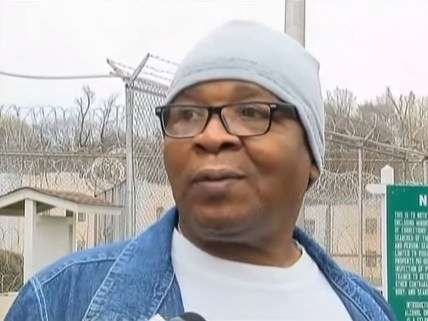Ex-prosecutor Apologizes to Exonerated Man He Put on Death Row
"I was arrogant, judgmental, narcissistic and very full of myself."
In a letter of stunning candor that should give pause to proponents of the death penalty, former Caddo Parish prosecutor A.M. "Marty" Stroud III responded to a Shreveport Times editorial calling on the state of Louisiana to stop fighting Glenn Ford's efforts to collect the $330,000 compensation package he is owed for serving more than 30 years in prison for a murder he didn't commit.

According to the Times, Ford "has been diagnosed with Stage 4 lung cancer, and on Feb. 23 doctors told him he is only expected to live for four to eight more months." Though Ford was exonerated, the state claims he is not entitled to compensation because he can't prove he is "factually innocent."
This led Shroud, whose prosecutorial reliance on "junk science" in 1984 landed Ford on death row, to write:
"Glenn Ford should be completely compensated to every extent possible because of the flaws of a system that effectively destroyed his life. The audacity of the state's effort to deny Mr. Ford any compensation for the horrors he suffered in the name of Louisiana justice is appalling."
Shroud makes very clear that he believes the state's semantic argument that Ford does not meet its requirements for compensation is absurd:
Pursuant to the review and investigation of cold homicide cases, investigators uncovered evidence that exonerated Mr. Ford. Indeed, this evidence was so strong that had it been disclosed during of the investigation there would not have been sufficient evidence to even arrest Mr. Ford!
And yet, despite this grave injustice, the state does not accept any responsibility for the damage suffered by one of its citizens. The bureaucratic response appears to be that nobody did anything intentionally wrong, thus the state has no responsibility. This is nonsensical. Explain that position to Mr. Ford and his family. Facts are stubborn things, they do not go away.
Later, Shroud attempts to make penance for how he conducted himself during the course of the investigation and trial:
In 1984, I was 33 years old. I was arrogant, judgmental, narcissistic and very full of myself. I was not as interested in justice as I was in winning. To borrow a phrase from Al Pacino in the movie "And Justice for All," "Winning became everything."
Had I been more inquisitive, perhaps the evidence would have come to light years ago. But I wasn't, and my inaction contributed to the miscarriage of justice in this matter. Based on what we had, I was confident that the right man was being prosecuted and I was not going to commit resources to investigate what I considered to be bogus claims that we had the wrong man.
My mindset was wrong and blinded me to my purpose of seeking justice, rather than obtaining a conviction of a person who I believed to be guilty. I did not hide evidence, I simply did not seriously consider that sufficient information may have been out there that could have led to a different conclusion. And that omission is on me.
Shroud concludes with a repudiation of capital punishment itself:
No one should be given the ability to impose a sentence of death in any criminal proceeding. We are simply incapable of devising a system that can fairly and impartially impose a sentence of death because we are all fallible human beings.
The clear reality is that the death penalty is an anathema to any society that purports to call itself civilized. It is an abomination that continues to scar the fibers of this society and it will continue to do so until this barbaric penalty is outlawed. Until then, we will live in a land that condones state assisted revenge and that is not justice in any form or fashion.
Go here for more Reason coverage on the death penalty, and be sure to check out my documentary on "The Battle for Death Penalty Transparency" below.


Show Comments (40)